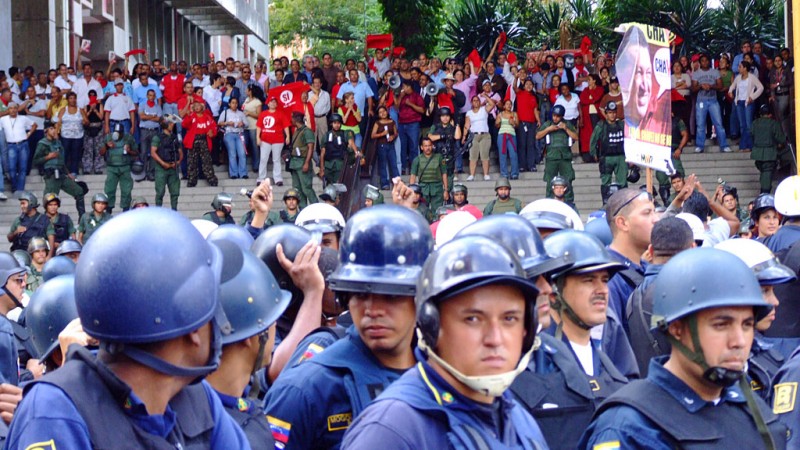
Former Metropolitan Police, the National Guard and Chavez Followers dressed in red holding posters during a rally. Photo taken from Flickr account of Rodríguez Suárez under Creative Commons License.
Last year, protests and repressions that left hundreds detained in Venezuela made international headlines. But the kind of everyday violence that has dragged the country down over the years is now so routine it stopped being newsworthy long ago.
One story that has been lost in the deluge of killings and other acts of violence is the extreme risks police now face doing their job.
According to the Venezuelan Observatory of Violence (OVV), in 2014 Venezuela had 24,980 violent deaths, or 82 murders per 100,000 inhabitants. That gives Venezuela the second highest murder rate in the world, surpassed only by Honduras and well above any country currently at war.
Tasa de homicidios por cada 100.000 habitantes: México: 17. Colombia: 28. Brasil: 29. Venezuela: 82. Fuente: OVV http://t.co/4GKCS1Ni7u
— John Mervin Tizamo (@jtizamo) July 8, 2015
Homicide rate per 100,000 inhabitants: Mexico 17. Colombia: 28. Brasil 29. Venezuela: 82. Source OVV
State media in Venezuela glosses over the problem. None of the main pro-government newspapers have a section devoted to violent deaths or crimes, a surprising fact given the capital city of Caracas sees dozens of violent deaths occur every weekend.
For police officers, whose colleagues are regularly killed both in the line of duty and in their spare time, this is a slap in the face.
Moving targets
In the first six months of 2015, 120 officers have been killed according to independent media adding data for each region. The government does not report their dead agents even when they are killed with grenades and assault rifles, as happened in March 2015 in an area of Caracas called El Cementerio.
A dead policeman is a trophy for criminal gangs. Their murder, either as an attack or an act of revenge, gives status to criminals. And all of this is made worse by the rate of criminal impunity: 98% of all homicides committed in the country go unpunished.
César Marín, a member of Amnesty International and the International Action Network representative on Small Arms (IANSA) indicates that policemen die in the same numbers as young men in urban slums, assaulted taxi drivers or even people in street quarrels.
They have no escape from daily violence. The risks inherent to their own profession only make them even more vulnerable.
Official denial, public anger
Official sources have tried to refute the statistics of the OVV. The Interior Ministry of Justice and Peace does not publish official statistics or allow access to this data since 2008, while government spokespeople occasionally pop up to pour cold water on the figures.
For instance, Attorney General of the Republic, Luisa Ortega Díaz, declared at the UN in June 2014 that the homicide rate was not 82 but 62 violent deaths per 100,000 inhabitants. Even with that number, Venezuela continues to rank high among the world's most violent nations.
But silencing data on violence and censoring information associated with violence has not worked to reduce the scourge.
So many families have had loved ones taken from them that morgues routinely see lines of people waiting to recognize possible relatives. None of this is news. Nor is the killing of police officers.
Journalist Altagracia Anzola wrote in her Twitter account:
El saldo desastroso d lo q ocurrió ayer en la Cota 905 y El Cementerio fue de 2 pnb muertos y 5 policías heridos.Granadas, pistolas, fusiles
— Altagracia Anzola (@Alanzola) March 31, 2015
The disastrous total of what happened yesterday in the Cota 905 and El Cementerio was two National Bolivarian Policemen (PNB) dead and five officers injured. Grenades, pistols, rifles.
Marching for a more secure Venezuela
In a February interview with Global Voices, Pablo Fernandez, Executive Secretary of the General Council of Police, warned that most agents were vulnerable due to “reduced years of training, immaturity, lack of confidence in their own capabilities to respond to stress, limited training in progressive and differentiated use of force, [and] little self-control or self-protection.”
With a verdict like this coming from the public servant in charge of agents’ training, it is easy to understand the high levels of risk Venezuelan police are exposed to.
Leaving their weapons at the station and going home is also difficult. Most police live in the same poor and dangerous neighbourhoods as the criminals. Sometimes, revealing their profession can also be quite risky.
Claiming to be “socialist, chavista and anti-imperialist”, will not save officers off duty from a bullet, either.
Human Rights NGO Cofavic has warned that with the increase of the number of officers killed, demand to join the security forces is sinking fast. Salaries tend to be unattractive. Some agents must work as taxi drivers and bodyguards in their spare time to make ends meet.
This background makes a seemingly unusual event that took place last April actually completely logical: a march against insecurity organized by Caracas’ police officers in which members of six police forces agreed to protest against the violent deaths of their co-workers.
Policaracas, the main force of the capital, and the Bolivarian National Police — controlled by national authorities — were forbidden to participate. So some of them went dressed as civilians, with others asking family members to protest on their behalf.
The march was not covered by public media:
Realizaron marcha en la Cota Mil contra el asesinato de policías http://t.co/AsxGmEKWWi pic.twitter.com/FN4CREIGdF — 800 Noticias (@800Noticias) April 19, 2015
March in Cota Mil (popular section of Caracas) to protest against the killing of policemen
Con toque de diana en honor a funcionarios caídos terminó hoy la marcha de los #policías http://t.co/omEz9bfAW7 pic.twitter.com/PAxZFPsKA4
— Contrapunto (@contrapuntovzla) April 19, 2015
With a reveille to honor the law enforcement officers killed in the line of duty the the police march ended today.






